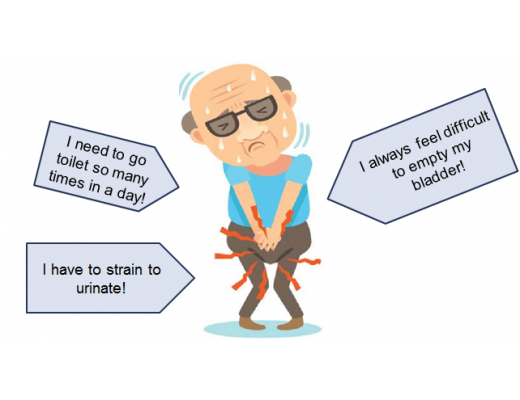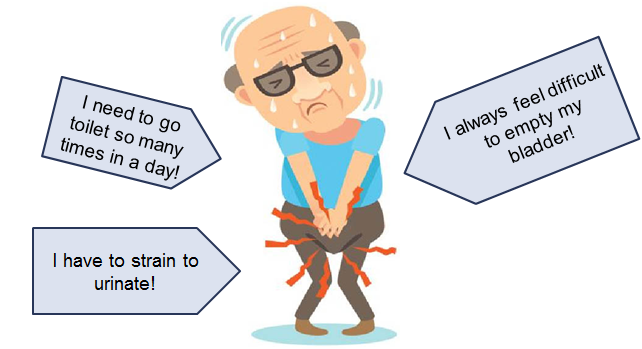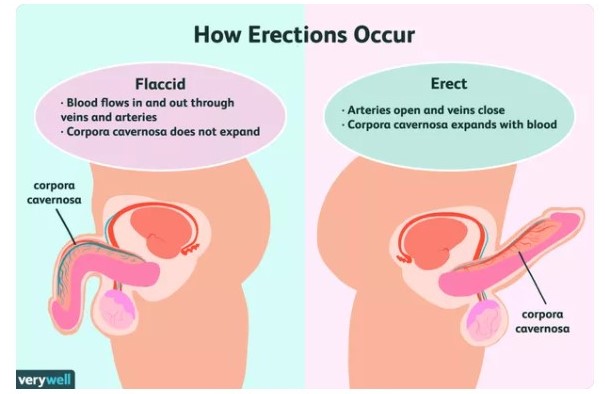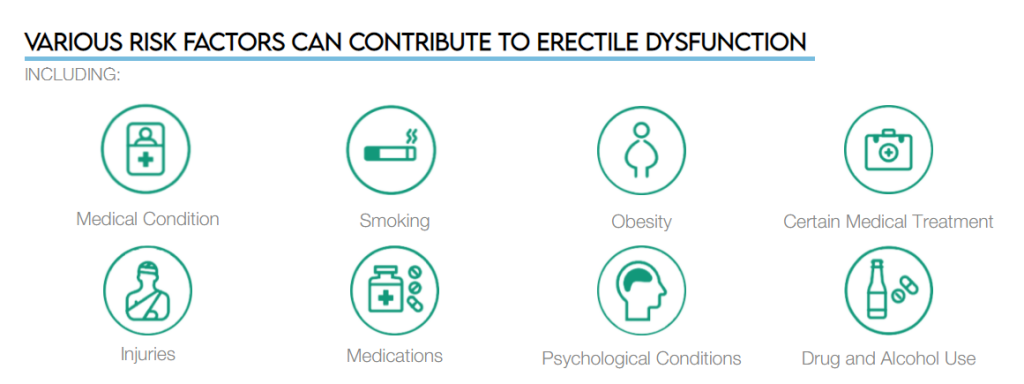Health Articles
Find out more about your health here from our health professionals!

Benign Prostatic Hyperplasia

Benign Prostatic Hyperplasia (BPH)
Benign prostatic hyperplasia (BPH) is a condition in men where the prostate gland is enlarged but non-cancerous. As the prostate enlarges, the gland presses and pinches against the urethra. The bladder wall becomes thicker (Figure 1). Eventually, the bladder may become weaken and lose the ability to empty completely, leaving some urine in the bladder.

Figure 1: Normal prostate vs enlarged prostate
BPH affects about 50 percent of men between the ages of 51 and 60 and up to 90 percent of men older than 80, evidence clearly shows that the morbidity of BPH increase with age. In addition, BPH can be induced by a range of risk factors, including obesity, hyperlipidemia, type 2 diabetes, genetic factor and certain hormonal disorders.
The common symptoms of BPH includes:
- Difficulty starting to urinate despite pushing and straining
- A weak stream of urine; several interruptions in the stream
- Dribbling at the end of urination
- A sudden strong desire to urinate
- Frequent urination
- The sensation that the bladder is not empty after urination is completed
- Frequent awakening at night to urinate (nocturia)
- Pain while urinating
How is benign prostatic hyperplasia (BPH) treated?
At present, the primary goals of BPH treatment are to improve quality of life, inhibit disease progression, and reduce complications. BPH is usually treated with alpha-adrenergic blockers and 5-alpha reductase inhibitors. Alpha blocker helps to relax the smooth muscles of the prostate and bladder neck to improve urine flow and reduce bladder blockage. It has faster onset of action so it is recommended as first line treatment for men with mild to moderate symptoms. Examples of alpha blockers are terazosin (Hytrin), doxazosin (Cardura) (Kamiren XL), tamsulosin (Harnal OCAS) and alfuzosin (Xatral). 5-alpha-reductase inhibitors are medicines that can stop the prostate from growing further or even cause it to shrink by decreasing the production of hormone, dihydrotestosterone (DHT) which affects the growth of prostate gland. Finasteride (Proscar) and dutasteride (Avodart) are example of alpha-reductase inhibitors.
Apart from medications, behavioural modifications and therapies may be helpful, particularly as an adjunct to medications. Lifestyle changes include nightly fluid restriction, timed bladder voiding, double-voiding techniques, regular physical activity, pelvic floor muscle training and avoiding caffeine, alcohol, and highly seasoned food.
*Double voiding – it involves passing urine twice each time you go to toilet. Firstly, urinate as usual then wait for 20-30 seconds, urinate again. This technique is effective for those who feel like their bladder is not empty or who return quickly to the bathroom after voiding.
Natural remedies for enlarged prostate (BPH)
- Saw palmetto
Remedy that comes from fruit of palm tree. It is an inhibitor of 5 alpha reductase. It has anti-inflammatory and hormone-blocking properties. Saw palmetto is used to relieve urinary symptoms caused by benign prostatic hyperplasia (BPH).
- Pygeum bark
It contains a wide range of fatty acids, alcohols and sterols such as beta-sitosterol. It has an antioxidant and anti-inflammatory effect on urogenital system. Able to improve symptoms of benign prostatic hyperplasia.
- Tomato
It consists of lycopene, a powerful antioxidant that protect cells from damage and improve prostate health.
- Pumpkin seed
It consists of zinc which is able to decrease the production of dihydrotestosterone (DHT) and inhibit this androgen from binding to receptors, potentially reducing BPH symptoms.
- Cranberry
It contains phytonutrients with anti-inflammatory properties. It is used to prevent bladder and urinary tract infection by preventing bacteria from sticking to the wall of the bladder. Shown improvement in urinary flow.
References:
- Information H, Diseases U, Problems P, Hyperplasia) P, Hyperplasia) P, Health N. Prostate Enlargement (Benign Prostatic Hyperplasia) | NIDDK [Internet]. National Institute of Diabetes and Digestive and Kidney Diseases. 2021 [cited 18 October 2021]. Available from: https://www.niddk.nih.gov/health-information/urologic-diseases/prostate-problems/prostate-enlargement-benign-prostatic-hyperplasia
- Egan K. The Epidemiology of Benign Prostatic Hyperplasia Associated with Lower Urinary Tract Symptoms. Urologic Clinics of North America. 2016;43(3):289-297.
- Calogero A, Burgio G, Condorelli R, Cannarella R, La Vignera S. Epidemiology and risk factors of lower urinary tract symptoms/benign prostatic hyperplasia and erectile dysfunction. The Aging Male. 2018;22(1):12-19.
- Yoo S, Oh S, Park J, Cho S, Cho M, Jeong H et al. The impacts of metabolic syndrome and lifestyle on the prevalence of benign prostatic hyperplasia requiring treatment: historical cohort study of 130 454 men. BJU International. 2018;123(1):140-148.
- Yu Z, Yan H, Xu F, Chao H, Deng L, Xu X et al. Efficacy and Side Effects of Drugs Commonly Used for the Treatment of Lower Urinary Tract Symptoms Associated With Benign Prostatic Hyperplasia. Frontiers in Pharmacology. 2020;11.
- Fonseca J, Martins da silva C. The diagnosis and treatment of lower urinary tract symptoms due to benign prostatic hyperplasia with α-blockers: focus on silodosin. Clin Drug Investig. 2015;35(suppl 1):7-18.
- 10 natural remedies for enlarged prostate and lifestyle tips [Internet]. Medicalnewstoday.com. 2021 [cited 4 November 2021]. Available from: https://www.medicalnewstoday.com/articles/321231#lifestyle-tips
-520x400.jpg)
Erectile Dysfunction(ED)
.jpg)
Erectile dysfunction (ED) refers to the inability to get or keep an erection firm enough to have sexual intercourse. Erectile dysfunction is usually caused by low blood flow to the penis or problem with the nerves that control erections. Having trouble erecting for short period of time is not necessarily a cause for concern but it can cause stress, affect your self-confidence and contribute to relationship problems if it becomes an ongoing issue.

What are the symptoms of erectile dysfunction (ED)?
The symptoms include persistent:
- Trouble getting an erection
- Trouble keeping an erection
- Reduced sexual desire
What causes erectile dysfunction (ED)?
Problems getting or keeping an erection can be due to various risk factors, including:
- Vascular diseases (such as atherosclerosis which means hardening of arteries): These conditions narrow the blood vessels and reduce blood flow to the penis.
- Neurological disorders (such as multiple sclerosis which is a chronic disease affecting the brain and spinal cord): Nerves that send impulses to the penis can become damaged from stroke, diabetes, or other causes.
- Psychological states: These include stress, depression, lack of stimulus from the brain as well as performance anxiety.
- Trauma: An injury could contribute to symptoms of ED.
- Chronic illness, certain medications, and operations for the prostate, bladder, and colon cancer may also be contributing factors.

How is erectile dysfunction (ED) treated?
- Get More Exercise
Regular physical activity improves blood circulation and decreases the risk of heart disease, diabetes, and obesity, all of which can have an impact on sexual function.
- Stop Smoking
Smoking affects circulation in ways that can inhibit blood flow to the penis and affect the ability to achieve or sustain an erection. Besides, smoking cessation has many other health benefits, such as reducing heart disease and diabetes which are the two major causes of ED.
- Eat Well
The risk of ED can be reduced in people who always eat diets that rich in whole-grain foods, vegetables, and fruits and low in red meat, full-fat dairy products, and sugary foods and drinks have a reduced risk of ED.
- Prescription Medications
The oral medications for erectile dysfunction enhance the effects of nitric oxide which is a natural chemical your body produces to relaxes muscles in the penis. This increases blood flow and lead to erection in response to sexual stimulation.
| Viagra (sildenafil) | May be effective within 30 to 60 minutes can last up to 12 hours |
| Cialis (tadalafil) | May be effective within 60 to 120 minutes and may last up to 36 hours |
| Levitra or Staxyn (vardenafil) | May be effective within 30 to 60 minutes and can last up to 10 hours |
| Stendra (avanafil) | May be effective within 15 to 30 minutes and can last up to 12 hours |
For Viagra, Levitra, and Stendra—eating a high-fat meal may delay the absorption of the drug, which will prolong the time for erection and diminish the drug’s overall effectiveness.
- Testosterone Replacement Therapy
A healthcare provider may prescribe testosterone replacement therapy if a man is found to have a low testosterone level, along with other symptoms, such as low libido and ED. That said, testosterone deficiency is uncommonly the primary cause of ED. Before you take testosterone, your healthcare provider will have you tested to make sure that you do indeed have a deficiency.
- Reviewing Current Medications
It is very possible that one or more of current list of medications may be causing or contributing to your erectile dysfunction. Medications that classically cause erectile dysfunction as a side effect are antidepressants, especially selective serotonin reuptake inhibitors (SSRIs), such as Zoloft (sertraline). Other potential medications linked to erectile dysfunction include certain blood pressure medications and pain medications.
- Pumps and Implants
A mechanical device may be worth trying if medications and other interventions don’t work.
One option is a vacuum pump, a plastic tube that is placed over the penis. When air is sucked out of the tube it creates pressure that causes blood to be forced into the penis. A ring can then be temporarily placed at the base of the penis to stop the blood from draining away too quickly.
A penile implant is another option. There are two types of penile implant. The first type is called a semi-rigid penis implant, it keeps the penis erect all the time, though it can be bent downward when you aren’t having sex. The other type is an inflatable two- or three-piece penis implant, it includes a pump that’s implanted in the scrotum and can be squeezed in order to make the penis erect.
- Natural Remedies
Research has found that certain natural remedies can improve ED to some extent. Here is a guide of herbs and supplements that may help improve the symptoms of erectile dysfunction:
| Studied in people, positive results, generally safe | ||
| Herb or supplement | Does it work? | Safety |
| DHEA | Some evidence shows that dehydroepiandrosterone (DHEA) increases libido in women and helps erectile dysfunction in men. | DHEA appears to be safe at low doses. It can cause acne. |
| L-arginine | Some evidence shows that taking high doses of L-arginine improves erectile dysfunction by stimulating blood vessels to open wider for improved blood flow | Side effects may include nausea, cramps and diarrhoea. However, it is not recommended to take L-arginine with sildenafil (Viagra). |
| Ginseng | One study of Panax ginseng has shown that it improves sexual function in men with erectile dysfunction. A cream preparation is used for premature ejaculation. | Panax ginseng contains many active ingredients. It appears to be safe if used on a short-term basis. Insomnia, headaches and vertigo are common side effects. |
| Propionyl-L-carnitine | Studies have shown that propionyl-L-carnitine if combined with Viagra might improve erectile function better than sildenafil alone. | Propionyl-L-carnitine is likely to be safe when used under medical supervision. |
References:
- Michael Bihari, MD (2021) Causes and Risk Factors of Erectile Dysfunction.
Available at: https://www.verywellhealth.com/erectile-dysfunction-causes-and-risk-factors-1124108 - Alana Biggers (2019) Everything You Need to Know About Erectile Dysfunction (ED).
Available at: https://www.healthline.com/health/erectile-dysfunction#_noHeaderPrefixedContent - US Department of Health and Human Services, National Institute of Diabetes and Digestive and Kidney Diseases (2019) Erectile Dysfunction.
Available at: https://www.niddk.nih.gov/health-information/urologic-diseases/erectile-dysfunction/definition-facts - Borrelli F, et al(2018) Herbal dietary supplements for erectile dysfunction: A systematic review and meta-analysis.
Available at: doi:10.1007/s40265-018-0897-3. - U.S. Food and Drug Administration (2018) ‘All natural’ alternatives for erectile dysfunction: A risky proposition.
Available at: https://www.fda.gov/ForConsumers/ConsumerUpdates/ucm465024.htm.




